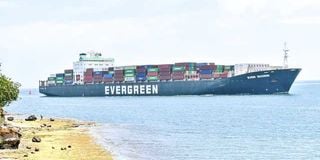Report: Shipping carbon levy could hurt African economies, increase food insecurity

A container vessel passes through the Kilindini harbour at the Port of Mombasa.
What you need to know:
- At least 39 countries, including Ethiopia, Malawi and Namibia, support the global greenhouse gas levy, which they see as a critical milestone in accelerating the shipping industry's transition to clean energy.
As the world intensifies efforts to combat climate change, the maritime industry has become a key sector under scrutiny due to its significant greenhouse gas (GHG) emissions.
The International Maritime Organization (IMO), the global body regulating shipping, aims to achieve net-zero emissions by 2050. Its ambitious intermediate targets include reducing total annual GHG emissions by at least 20 per cent by 2030 and striving for an 80 per cent reduction by 2040 compared to 2008. To meet these targets, the IMO is considering the introduction of a shipping carbon levy, a financial mechanism intended to internalise the environmental costs of maritime emissions.
At least 39 countries, including Ethiopia, Malawi and Namibia, support the global greenhouse gas (GHG) levy, which they see as a critical milestone in accelerating the shipping industry's transition to clean energy.
However, a new report by the Africa Policy Research Institute (APRI), the Firoz Lalji Institute for Africa at the London School of Economics, and the African Future Policies Hub, has raised concerns about the economic implications of such a measure, particularly for African nations. Titled “Navigating Climate Action: Assessing the Economic Impacts and Trade-offs of a Shipping Carbon Tax for African States,” the report explores the potential risks and trade-offs associated with the proposed levy.
The report's release comes against the backdrop of the 82nd session of the Marine Environment Protection Committee (MEPC 82). The IMO Secretary-General, Arsenio Dominguez, urged delegates to focus on finding solutions and areas of convergence as negotiations progress on measures to reduce shipping emissions, particularly the adoption of binding mid-term GHG reduction targets set for 2025. These include a global fuel standard and a pricing mechanism to drive the industry toward net-zero emissions by around 2050. Dominguez emphasised the importance of compromise, stating: “It is important to remember that we all share the same goals here at IMO.”
The carbon levy debate is taking place in the context of larger global financial and climate justice discussions. The Climate Vulnerable Forum Leaders' Declaration, issued just before MEPC 82, highlighted the need for “transformative change in the global financial system” to protect climate-vulnerable states.
The APRI report uses the Global Trade Analysis Project Energy-Environmental Computable General Equilibrium model to assess the potential impact of a shipping carbon levy on African economies. The findings reveal that the levy, while intended to curb carbon emissions, could have unintended consequences on the economic stability of African countries, many of which depend heavily on maritime trade.
The carbon levy would likely reduce the supply of maritime shipping services across Africa by up to seven per cent due to increased operational costs for shipping companies. This reduction, the report posits, would increase shipping costs, making imported goods more expensive and potentially decreasing international trade volumes.
As nearly 90 per cent of Africa’s international trade is conducted via maritime transport, the report warns that higher shipping costs could exacerbate existing challenges such as the high cost of living and food insecurity.
“Almost 90 per cent of Africa’s global trade is done by sea. Africa’s dependence on shipping makes it vulnerable to changes in the sector. Our countries must engage with the issue with a clear understanding
of the risks and a realistic assessment of the opportunities, particularly considering the investment landscape, including in green hydrogen and maritime shipping fuels,” said Faten Aggad, executive director at
the African Future Policies Hub. “While the decarbonisation of the maritime sector is a matter of “when” rather than “if”, ensuring that it is done in a way that does not shift the burden from the polluter to African citizens will be important. Hence, we encourage countries to
strongly support a clear mechanism for out-of-sector redistribution.”
The report also forecasts a rise in global food prices, with agricultural and processed food commodities expected to increase by 0.011 per cent and 0.013 per cent, respectively.
For many African nations that rely heavily on food imports, this price hike could have severe implications for food security. Ghana, for example, is expected to see household incomes fall by 0.101 per cent, which is 10 times higher than the projected income reduction for European households.
The report recommends redistributing a significant portion of the levy revenues to fund out-of-sector initiatives such as renewable energy projects, climate resilience and food security programmes. This would help offset the financial burden on developing economies and align with the “polluter pays” principle.
David Luke, professor at the LSE Firoz Lalji Institute for Africa, who co-authored the report, said: “An equitable transition is crucial for ensuring that African countries are not disproportionately affected by the costs of decarbonisation. We need policies that consider the unique challenges faced by developing countries and ensure that the benefits of a green transition are shared globally.”
The report also calls for flexibility in the use of transition fuels, allowing African countries to adopt intermediate solutions while gradually moving toward greener shipping technologies. Furthermore, it urges that any financial assistance provided to African countries as part of the transition must be direct transfers rather than loans to prevent increasing the debt burden of already struggling economies.





